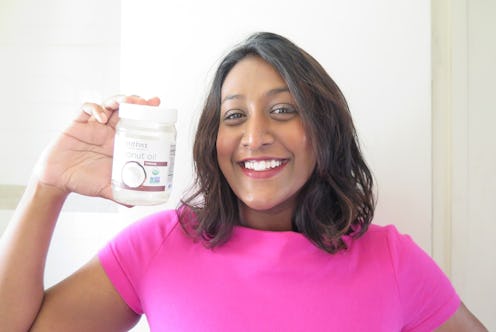Style
How To Use Coconut Oil To Soothe Painful & Itchy Eczema Flare-Ups

When I get an eczema flare-up, the only thing I want to do is have the ability to tear my skin off in hopes of growing a new one that doesn't have any kind of atopic dermatitis. There are plenty of creams out there that claim to provide relief, but if you're looking for a more natural fix, using coconut oil for eczema is a totally legit option. According to dermatologist Dr. Shari Sperling, DO, coconut oil is a great way to soothe eczema, though it won't cure it. "Coconut oil is a fatty acid that helps to moisturize skin, sooth and reduce irritation. It won’t cure eczema, but it can be used to help soothe and moisturize," she tells Bustle.
I've suffered from eczema since I was about 11; my clueless uncle commented about how "dirty" my neck looks referring to my eczema scars. Little did he know, not only did he make me super self conscious, it also kickstarted a lifelong issue with my neck. It doesn't help that I lived in a humidity bubble disguised as a country and my eczema gets triggered by heat, humidity, dust and stress.
Nutiva Organic Extra Virgin Coconut Oil, $8, Amazon
Anybody who complains about dry skin in winter doesn't understand half the excruciating torture that you go through with eczema; between trying not to lose your mind when you get an eczema flare-up, constantly stocking your bathroom with more creams than CVS and actually not being able to sleep from the itch, suffering from eczema could easily be a full time job. Let's not even talk about asthma, and allergies that a lot of us eczema sufferers also have on our shoulders. So, if you're just about fed up with all those OTC treatments, let's talk a little about how to add coconut oil to your routine instead.
Cut Out Triggers First
Over the years, I've been prescribed antihistamines that could knock out the biggest Sri Lankan elephants, a cornucopia of steroid creams and, of course, I've come running to my doctor desperate for a cortisone shot when I cannot stand the itch any longer. As an adult though, I have been experimenting with many things, including my diet, to help control my eczema, and I've seen the biggest results when I cut gluten out of my diet. Sperling agrees that certain foods can trigger eczema. "Eczema is an inflammatory, chronic skin condition. It can be triggered by some foods, including dairy, citrus, eggs, and gluten. It also can be caused by genetics. In order to figure out if it’s due to a food allergy, you can try an elimination diet to see if you react to a certain type of food," she shares with Bustle.
While I stopped itching, the scarring remained and because I've darker skin, the scars and the dry skin just made my neck, the back of my knees and the insides of my elbow look much, much darker. Can you imagine how hard it was looking for foundation that matched my neck and my face?
Bring On The Coconut Oil
I am a coconut oil devotee. I oil pull on a daily basis (and swears it clears my sinuses each morning and whitens my teeth), I use coconut oil in hair masks, and I use it on my eczema scars. You can roll your eyes if you want but here's how much the eczema and scarring on my neck has improved with regular application of coconut oil:
Coconut oil has antibacterial, anti-fungal, antioxidant and antimicrobial properties that can help soothe your skin when it's itchy during a flare-up, and can also help reduce the inflammation.
On top of that, it contains lauric acid, a type of fat that is found in mother's breast milk, and of all things, coconut oil. The acid is used to treat a variety of viral infections because the body converts it into something called monolaurin, a compound that fights against bacteria, fungus, viruses and all that good stuff.
Coconut oil is also packed with caprylic acid, vitamins E and K, and capric acid. All these help to repair broken skin and nourish it at the same time with the natural oil. It also helps decrease the itching and flaking, plus prevents further infection.
How To Use Coconut Oil
Buy organic extra virgin coconut oil to start with. There are three methods that I find particularly work for me, and my personal battle with eczema.
1. Apply it directly
This method is the easiest of course: Just apply the oil onto the parts of your body that are affected by eczema at least three times a day. I usually apply it just after my shower in the morning, twice during the day and once before bed.
It's generally impractical to lug around an entire bottle of oil with you, so dispense some into a contact lens container to make it travel sized.
2. Consume it
Although there isn’t conclusive evidence that consuming coconut oil helps eczema, some people have found it to be helpful, Sperling tells Bustle. Personally, I have found that it has. If the idea of of swallowing spoonfuls of oil isn't particularly appealing, think of it as swallowing fish oil supplements but instead of capsules, you're going to be chugging back 2-4 tablespoons daily.
3. Make a wash-off oil-based mask out of it
Combine 5 tablespoons of diluted coconut oil with two tablespoons each of rosemary oil and vitamin E oil into a little bottle and shake it to mix it all up. Apply on your eczema areas and leave it on for at least ten minutes before washing it off with water.
Nutiva Organic Extra Virgin Coconut Oil, $8, Amazon
This post was originally published on May 22, 2015. It was updated and republished on June 24, 2019. Additional reporting by Sara Tan.
This article was originally published on